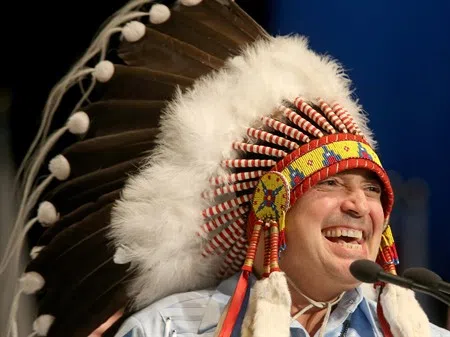
Perry Bellegarde: ‘Canada is Indian land’
Reported by Chinta Puxley, The Canadian Press
WINNIPEG – The new national chief of the Assembly of First Nations is warning it will no longer be business as usual when it comes to development on First Nations land.
In a fiery speech to assembly delegates in Winnipeg on Wednesday, Saskatchewan’s Perry Bellegarde singled out pipelines and energy development as one of the frontlines in his battle to put First Nations on equal footing with the rest of Canada.
“To the people across this great land, I say to you, that the values of fairness and tolerance which Canada exports to the world, are a lie when it comes to our people,” Bellegarde said. “Canada will no longer develop pipelines, no longer develop transmission lines, or any infrastructure, on our lands as business as usual.

